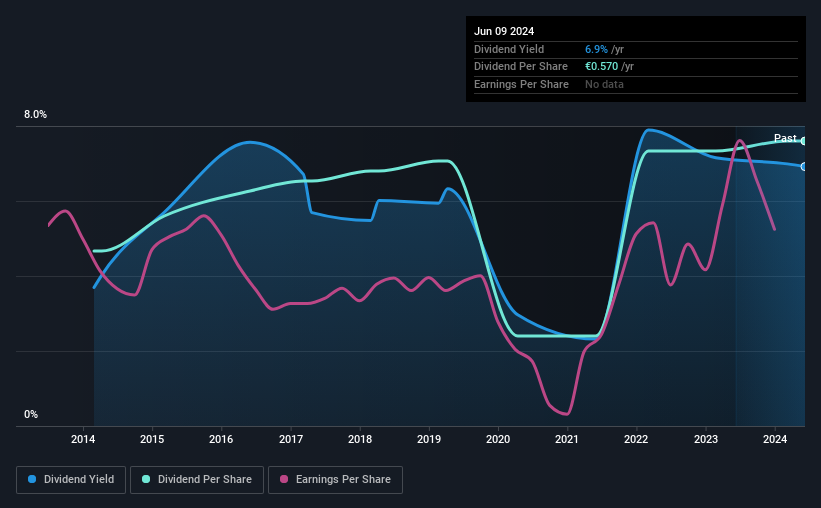Is It Worth Considering UNIQA Insurance Group AG (VIE:UQA) For Its Upcoming Dividend?
It looks like UNIQA Insurance Group AG (VIE:UQA) is about to go ex-dividend in the next 3 days. The ex-dividend date is one business day before a company's record date, which is the date on which the company determines which shareholders are entitled to receive a dividend. The ex-dividend date is of consequence because whenever a stock is bought or sold, the trade takes at least two business day to settle. Therefore, if you purchase UNIQA Insurance Group's shares on or after the 13th of June, you won't be eligible to receive the dividend, when it is paid on the 17th of June.
The company's next dividend payment will be €0.57 per share, and in the last 12 months, the company paid a total of €0.57 per share. Last year's total dividend payments show that UNIQA Insurance Group has a trailing yield of 6.9% on the current share price of €8.24. We love seeing companies pay a dividend, but it's also important to be sure that laying the golden eggs isn't going to kill our golden goose! We need to see whether the dividend is covered by earnings and if it's growing.
View our latest analysis for UNIQA Insurance Group
Dividends are usually paid out of company profits, so if a company pays out more than it earned then its dividend is usually at greater risk of being cut. UNIQA Insurance Group paid out 54% of its earnings to investors last year, a normal payout level for most businesses.
Generally speaking, the lower a company's payout ratios, the more resilient its dividend usually is.
Click here to see how much of its profit UNIQA Insurance Group paid out over the last 12 months.

Have Earnings And Dividends Been Growing?
Stocks in companies that generate sustainable earnings growth often make the best dividend prospects, as it is easier to lift the dividend when earnings are rising. Investors love dividends, so if earnings fall and the dividend is reduced, expect a stock to be sold off heavily at the same time. With that in mind, we're encouraged by the steady growth at UNIQA Insurance Group, with earnings per share up 5.8% on average over the last five years.
Another key way to measure a company's dividend prospects is by measuring its historical rate of dividend growth. UNIQA Insurance Group has delivered 5.0% dividend growth per year on average over the past 10 years. It's encouraging to see the company lifting dividends while earnings are growing, suggesting at least some corporate interest in rewarding shareholders.
The Bottom Line
Should investors buy UNIQA Insurance Group for the upcoming dividend? UNIQA Insurance Group has been generating some growth in earnings per share while paying out more than half of its earnings to shareholders in the form of dividends. We think there are likely better opportunities out there.
If you're not too concerned about UNIQA Insurance Group's ability to pay dividends, you should still be mindful of some of the other risks that this business faces. In terms of investment risks, we've identified 1 warning sign with UNIQA Insurance Group and understanding them should be part of your investment process.
Generally, we wouldn't recommend just buying the first dividend stock you see. Here's a curated list of interesting stocks that are strong dividend payers.
The New Payments ETF Is Live on NASDAQ:
Money is moving to real-time rails, and a newly listed ETF now gives investors direct exposure. Fast settlement. Institutional custody. Simple access.
Explore how this launch could reshape portfolios
Sponsored ContentNew: AI Stock Screener & Alerts
Our new AI Stock Screener scans the market every day to uncover opportunities.
• Dividend Powerhouses (3%+ Yield)
• Undervalued Small Caps with Insider Buying
• High growth Tech and AI Companies
Or build your own from over 50 metrics.
Have feedback on this article? Concerned about the content? Get in touch with us directly. Alternatively, email editorial-team (at) simplywallst.com.
This article by Simply Wall St is general in nature. We provide commentary based on historical data and analyst forecasts only using an unbiased methodology and our articles are not intended to be financial advice. It does not constitute a recommendation to buy or sell any stock, and does not take account of your objectives, or your financial situation. We aim to bring you long-term focused analysis driven by fundamental data. Note that our analysis may not factor in the latest price-sensitive company announcements or qualitative material. Simply Wall St has no position in any stocks mentioned.
About WBAG:UQA
UNIQA Insurance Group
Operates as an insurance company in Austria and Central and Eastern Europe.
Solid track record, good value and pays a dividend.
Similar Companies
Market Insights
Weekly Picks

Early mover in a fast growing industry. Likely to experience share price volatility as they scale


A case for CA$31.80 (undiluted), aka 8,616% upside from CA$0.37 (an 86 bagger!).


Moderation and Stabilisation: HOLD: Fair Price based on a 4-year Cycle is $12.08
Recently Updated Narratives


Title: Market Sentiment Is Dead Wrong — Here's Why PSEC Deserves a Second Look


An amazing opportunity to potentially get a 100 bagger

Amazon: Why the World’s Biggest Platform Still Runs on Invisible Economics
Popular Narratives


Crazy Undervalued 42 Baggers Silver Play (Active & Running Mine)


MicroVision will explode future revenue by 380.37% with a vision towards success


NVDA: Expanding AI Demand Will Drive Major Data Center Investments Through 2026
Trending Discussion


